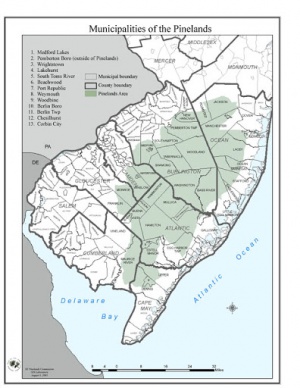Pine Barrens
The New Jersey Pine Barrens - The Area & Its Ecology
The central and south Jersey Pine Barrens are a unique area that covers approximately 1.1 million acres, which is nearly one quarter of the state’s total land mass. The area is part of the Atlantic Coastal Pine Barrens, which cover the coastal plain of New Jersey, much of the southern half of Long Island and Cape Cod, Massachusetts. Like all Pine Barrens, the land is underlain by sandy, nutrient-poor, acidic soils that support a stunted forest comprised primarily of pitch pine (Pinus rigida) and blackjack oak (Quercus marilandica.) Underlying much of these pinelands is the Cohansey Aquifer. This formation of unconsolidated sand and gravel functions as a vast reservoir estimated to contain over 17 trillion gallons of some of the purest water in the country. The water in this shallow aquifer lies at or near the surface, producing bogs, marshes, and swamps. The numerouse streams of the pinelands are fed by this aquifer. Natural organic contents leaching out of the soils (tannin from decaying pine needles, for instance) are responsible for the dark tea color of the region's streams. The area holds ample amounts of native wild blueberry, cranberry and raspberry throughout the region. Early settlers from the 1600's pegged the term 'barrens' as they had little luck utilizing the land for traditional cultivation, primarily due to its sandy, acidic, nutrient poor soil. Farming does take place by growing native plants such as blueberries and cranberries. Other limited commercial crops are grown by adding soil nutrients and raising the PH of the soil. Today, the Pine Barrens hold a strong and diverse mix of flora and fauna - home to an estimated eight-hundred and fifty species of plants and three hundred and fifty species of birds, mammals, reptiles, and amphibians. There is also a rich history of anecdotal Bigfoot / Sasquatch sightings within the New Jersey Pine Barrens. Could Bigfoot / Sasquatch be one of its resident species?
Bigfoot's 'Barren' History
The idea that there may be Bigfoot / Sasquatch activity in New Jersey is not a new one. There have been reports of encounters with these creatures in the state as far back as January, 1894 and as recently as June, 2006. One of the Most Incredible Alleged Encounters happened in May, 1977 on a farm in the small town of Wantage in Sussex County.
There have been at least a dozen reports of these creatures in the Pine Barrens area over the years, starting in 1966 in the town of Lower Bank located in the barrens. More recently there have been quite a few reports of encounters in and around the Wharton and Bass River State Forest areas. There have been at least four reports from within Wharton State Forest and two from within Bass River State Forest, one of these was in 2003.
